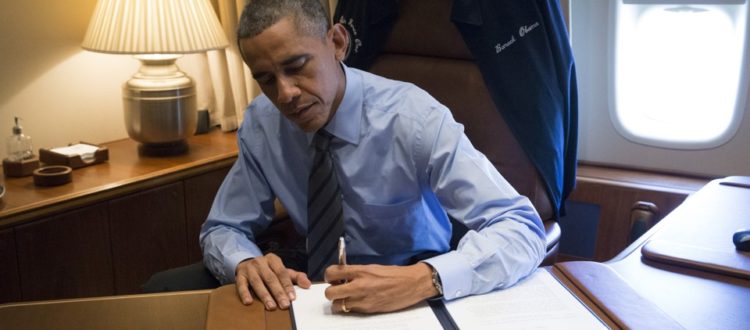Immigration Ruling Shows Risks of Relying on Executive Actions
Published on November 13th, 2015
By Ariane de Vogue
November 13, 2015
CNN
Washington (CNN)If President Barack Obama and Democrats needed another reminder that his legacy and policy victories are not set in stone, a federal appeals court provided it this week when it blocked his immigration initiatives — meant to ease deportation threats for around 5 million undocumented immigrants — from taking effect.
Now the administration is about to turn to the Supreme Court, hoping it will reverse the lower court and blunt criticism from those who believe Obama has gone too far in his effort to enact change.
White House Counsel Neil Eggleston, speaking at an event sponsored by the conservative Federalist Society on Thursday, said that immigration issue has "obviously made its way back into the news recently."
Executive actions are a broad category of power that a president can exercise to change policy. They come in different forms that include everything from regulations to executive orders to recess appointments, and many other tools. The problem for the White House: they can sometimes be blocked by Congress, rejected by the courts or revised by any future administration.
Another problem: There's no controlling what the judiciary will do.
In its arguments before the 5th Circuit Court of Appeals, for example, the administration had argued strenuously that Texas and the 25 other states behind the challenge did not have the legal right to be in Court. In its 2-1 opinion, the majority disagreed. Now that opinion is on the books and has created a precedent that the dissenting judge described as a "breathtaking expansion of state standing" that would "inject the courts into far more federal-state disputes and review of the political branches than is now the case."
The president's critics say that at times he has overreached and attempted to re-write the law, immigration being a prime example. When he launched his immigration initiatives a year ago, Obama took on the criticism.
Why conservatives are upset with Ted Cruz on immigration
"The actions I'm taking are not only lawful, they're the kinds of actions taken by every single Republican President and every single Democratic President for the past half century," he said and referenced the fact that he was acting because he couldn't get Congress to act.
"To those members of Congress who question my authority to make our immigration system work better, or question the wisdom of me acting where Congress has failed, I have one answer: Pass a bill," he said.
But his efforts came to screeching halt when the appeals court ruled against him.
Even if the Supreme Court were to agree to hear the case and the justices were to rule against the president, the setback would not be expected to stymie assertions of executive power in other areas, nor would it likely discourage him from using the tool during the last leg of his presidency.
"I don't think it changes the landscape for him much at all in terms of executive power," said John Hudak who studies presidential power at Brookings Institution. "Immigration is a hot-button issue and it makes it seem like the President is wielding tremendous power, but the reality is that in terms of number and substance, the president is fairly mainstream in his use of executive power," Hudak said.
Adam Winkler, a professor of constitutional law at the UCLA School of Law, says the recent immigration loss won't stop the President from taking further executive action. "The ruling may still be overturned, and many other executive actions he's taken have endured." Winkler points out that the president has exerted the power on other hot button topics such as gun control and LGBT rights. "The immigration ruling did not say that the president had no power to take executive action, only that this action went too far."
Hudak says that the area of immigration has some risks that other areas do not. "If undocumented individuals feel like they can come out of the shadow because of executive action, if that executive action is thrown out, it puts them in a vulnerable position.' he said.
Hudak points out that President Obama has issued fewer executive orders — a subset of executive actions — than his predecessors.
Carrie Severino of the conservative Judicial Crisis Network says the problem with the president is not with the number of actions he has taken. "No one says using executive actions or orders is per se a problem, there is a legitimate role for the executive. He has the authority to take executive actions in general, but he does not have the authority to re-write the law," she said.
Severino says the immigration case is another example of a President "who seems to think he is above the law" and she fears he will continue to attempt to circumvent Congress "because the next executive action will be on a different issue, it will be a different law that he'll try to re-write and the Courts will have to start all over."
At his appearance, Eggleston emphasized that the administration has internal checks about the breadth of the president's power. "We asked the Office of Legal Counsel [a division of the Department of Justice that provides legal advice to the President and all the Executive Branch agencies] for an opinion on the issue," he said referring to immigration.
"They gave us," he said, "an opinion as to certain aspects that were under consideration that we could do and as to certain aspects that were under consideration that we couldn't do."
"We did the ones that OLC said we could do," he said.





